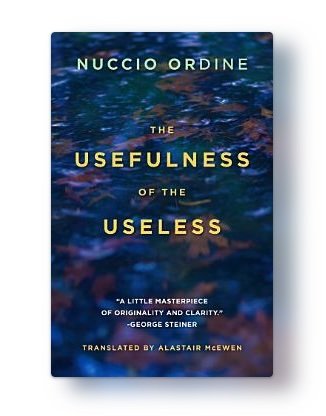Why Useless is Valuable: The Case for Bringing Arts, Philosophy, and History to the Workplace
Nuccio Ordine, in his profound exploration of what he terms "useless" knowledge, challenges us to rethink what we value in education, work, and life.
His work reveals the underestimated power of disciplines like the arts, philosophy, history, and music—areas often dismissed as impractical in the fast-paced, results-driven world we inhabit. Yet, it is precisely these fields that hold the keys to unlocking deeper creativity, more meaningful collaborations, and a workplace culture rooted in curiosity and innovation.
Ordine’s argument is simple yet revolutionary—value doesn’t always stem from utility. For businesses, this means that investing in disciplines that might not directly impact short-term profits can lead to profound long-term effects. When employees engage with art or literature, when they wrestle with philosophical questions or immerse themselves in history, they begin to see the world—and their work—through a broader lens. This expanded perspective doesn’t just enrich their personal lives; it transforms the way they approach complex problems, paving the way for unexpected innovation.
Enriching Creativity and Problem-Solving
The arts and humanities foster the very traits that make teams thrive—creativity, perspective, and empathy. For example, studying philosophy encourages critical thinking and the ability to examine ideas from multiple angles. History equips us with the wisdom of hindsight, helping us understand context and learn from patterns of the past. Music and the arts ignite our imagination, giving us the courage to think beyond the conventional. These disciplines cultivate minds that are agile and adaptable—capabilities that are indispensable in a workplace where change is the only constant.
Consider this in a business context. A team that has engaged with artistic disciplines is more likely to challenge assumptions, generate fresh ideas, and collaborate meaningfully. There’s a vulnerability and openness that come with sharing creative experiences—a concert, an art exhibit, a dialogue on literature—that translates into deeper trust and communication within teams.
Building a Holistic Workplace Culture
Beyond practical outputs, the humanities foster a workplace culture grounded in shared human values. Philosophy teaches us to approach conversations with curiosity instead of judgment—how powerful could this mindset be in a team meeting or negotiation?
Literature and art deepen empathy, enabling us to step into others’ shoes, whether they are colleagues, clients, or communities. History reminds us of our interconnectedness and the impact of our decisions on the future.
Ordine suggests that these disciplines cultivate a sense of being that is often missing in environments dominated by data and deadlines. By prioritizing human growth alongside professional development, companies can create spaces where employees feel valued not just for what they do, but for who they are.
Unexpected Innovation and Personal Growth
The paradox of “useless” knowledge is that it often produces the most surprising and rewarding outcomes. Employees who have spent time reflecting on philosophical questions or grappling with the meaning behind a novel are more likely to approach business challenges with fresh, bold ideas. This is the kind of innovation companies seek but cannot force—growth sparked by personal enrichment and curiosity.
“Humanistic knowledge, culture and education constitute the ideal amniotic fluid in which the ideas of democracy, freedom, justice, secularity, equality, the right to criticize, tolerance, solidarity and the common good can enjoy a vigorous development.”
Promoting these disciplines in the workplace might involve offering experiences like cultural workshops, storytelling sessions, or even simple acts like making space for creative dialogue. These investments send a clear message to employees that their development matters—not just in a professional sense but in a personal and human one. And when employees feel enriched, they bring their best selves to work.
A Call to Action
Nuccio Ordine reminds us that the greatest ideas often emerge when we are free to explore, imagine, and reflect. Companies have an extraordinary opportunity to lead the way in creating more thoughtful, inclusive, and innovative workplaces by investing in the humanities—not as a luxury, but as a necessity.
The arts, philosophy, history, and music are not just disciplines; they are doorways to discovery. By opening these doors, businesses stand to gain something far more valuable than immediate results—they foster a culture where employees thrive, organizations grow, and the world becomes just a little bit wiser.
At The Human Element, we advocate for a connected approach to corporate success that merges innovation, empathy, and culture. Ready to unlock your team's potential?
Invest in impactful team-building activities that foster deeper connections. Book your cultural experience today to see how art and creativity can enhance workplace relationships. Together, we can cultivate a more engaged, creative, and empathetic business world.






